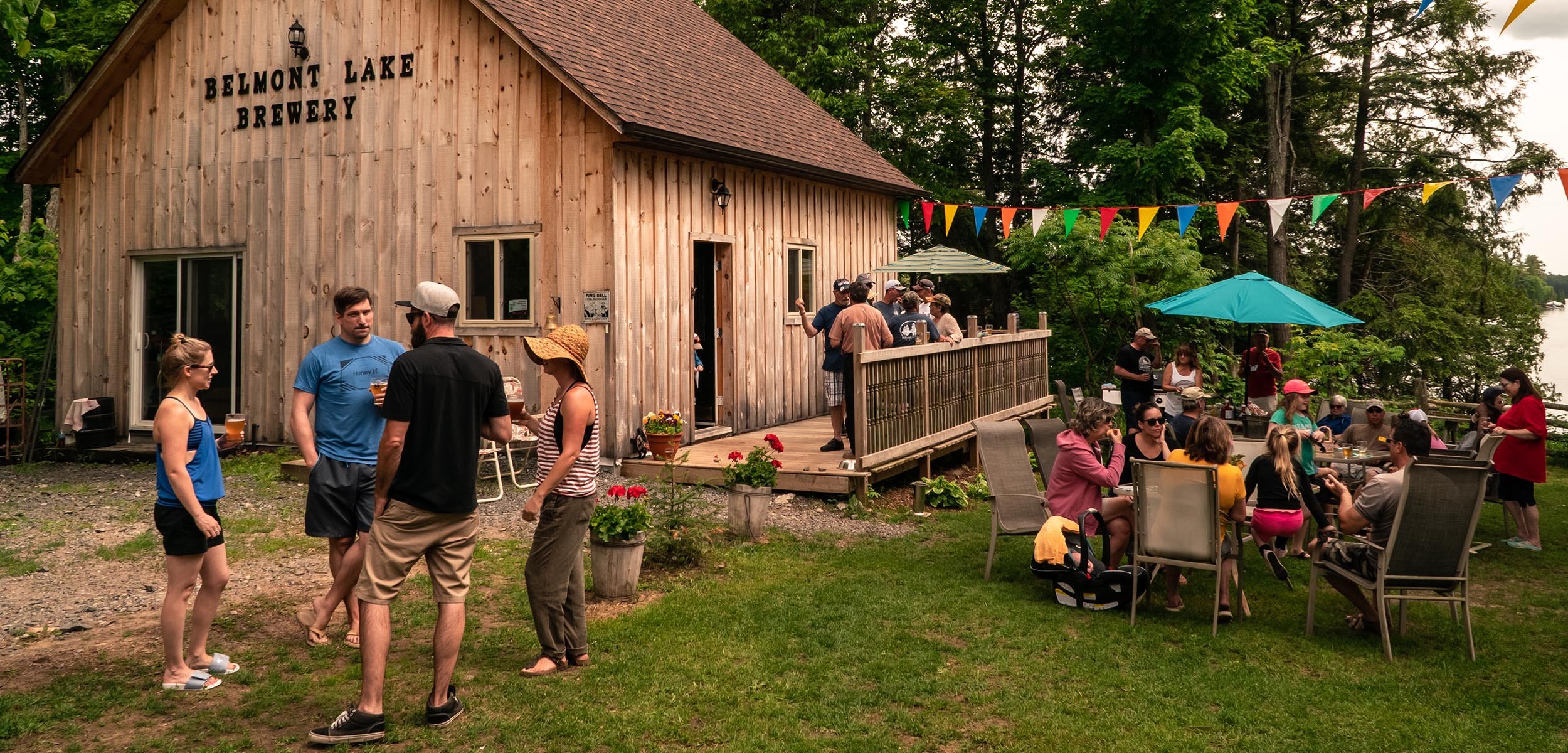
Case Study
Agritourism Development Strategy in Peterborough & the Kawarthas
How Peterborough & the Kawarthas Tourism are harnessing the power of agritourism to spur rural economic development
AUGUST 2022
THE CONTEXT
A region with a rich agricultural history and high potential for agritourism development
Peterborough and the Kawarthas is a region made up of eight townships and one city, Peterborough - often called the gateway city to cottage country. The region has many natural popular destinations for weekend vacationers, as it is in proximity to several urban centres. The regions history of farming, cattle ranching, and other agricultural industries are key assets within the local tourism economy; however, they were being underutilized.
Peterborough & the Kawarthas Tourism, a division of Peterborough & the Kawarthas Economic Development, with the support from their regional tourism organization, RTO8, are committed to promoting the tourism and agriculture industries to create economic development and bolster social and cultural pride within the community.
Agritourism is a valuable and effective rural economic development tool and there is growing consumer demand for agritourism products. Successfully investing in and developing agritourism can create positive social, cultural, and economic benefits in a community.
Although there is no singular definition of agritourism, it typically involves on-farm tourism activities related to agriculture and food production. Agritourism looks different in every destination as it is a combination of that destination’s unique agricultural landscape, history, heritage, culture, food, drink, and tourism assets.
Developing agritourism in a destination is a complex undertaking because it involves having a shared vision, the right regulatory environment, infrastructure investments, signage, cohesive marketing, and sales tactics. For agritourism operators, it means developing new skillsets for a new type of business.
The region’s stakeholders recognized a need to better understand how they could utilize best practices in sustainable agritourism development and create a plan. Peterborough & the Kawarthas Tourism engaged the Culinary Tourism Alliance (CTA) to support them in exploring growth opportunities for agritourism.
THE CHALLENGE
Celebrating tradition and getting visitors to linger longer
Kelly Jessup, Director of Marketing for Peterborough & the Kawarthas Economic Development, believes that “tradition is a big element” of the region’s agricultural identity, especially the tradition of small independent family farms. Unfortunately, many small family farms struggle to earn enough through agriculture to be profitable and compete in global commodity markets. Many are actively looking for ways to diversify their revenue.
Peterborough & the Kawarthas Tourism has been focused on bringing agriculture and tourism together for promotional and marketing initiatives to expand their economic impact. Despite winning awards provincially and nationally for culinary and agricultural tourism promotion, like many other destinations, creating lasting and meaningful connections between these two industries is often a challenge. For example, demand for things like unique overnight accommodations and agritourism experiences outpaced supply, yet there hadn't been any specific gap-analysis conducted or communicated between partners.
Just over 50% of visitors to the region were day-trippers and Peterborough & the Kawarthas Tourism saw this as an opportunity to boost tourism revenue by increasing overnight visitation with new on-farm accommodations.
Tourism and agriculture are very different industries from an operational standpoint, requiring different expertise, types of infrastructure, and investments. Becoming an agritourism entrepreneur has different challenges to running a farm and requires business owners to expand their capabilities into many different professional areas such as hospitality, marketing and sales, and product development, all while maintaining their agricultural operations. Peterborough & the Kawarthas Economic Development needed a plan to develop capacity and establish a sustainable agritourism industry.
“The driving force was wanting to go from simply promoting existing legacy tourism experiences (e.g., cottages, fishing) to tangible development work that better engaged the agricultural community. That’s we decided to engage the CTA to help us develop a comprehensive understanding for the opportunity for agritourism development in our region.”
— Joe Rees, Director of Tourism, Peterborough & the Kawarthas Economic Development

THE OPPORTUNITIES
Identifying the region’s assets and ways to utilize them
Peterborough & the Kawarthas Tourism recognized the growing consumer market and power of agritourism as a rural economic development tool. Joe Rees, recalls: “the marrying of those two industries, tourism and agriculture, as a support mechanism made ultimate sense to us and that’s why we wanted to invest and go deeper with this strategy.”
A community survey conducted by the CTA validated this thought: 100% of industry stakeholders surveyed believed that agritourism was an important part of the region’s future tourism offering. Further 72% of respondent’s stated they are already involved in the agritourism industry, confirming that they see the potential to expand the industry and attract more visitors.
Another feature making Peterborough and the Kawarthas a prime destination for agritourism development is its geographic location and ease of access– both of which are significant drivers in tourists’ decision-making. The region is located between Ottawa, Canada’s Capital City, and Toronto, Canada’s largest city, along a major highway.
At the time of the project (2018), Peterborough and the Kawarthas’ farming industry was evolving to have more small farms, making it well suited to adopting agritourism. The number of small farms increased from 26 in 2011 to 38 in 2016. Small farms are more inclined towards agritourism development since:
Many are likely to have experience being customer-facing businesses as they sell goods directly from the farm gate or at farmer’s markets.
Many small farm operators are also owners, and very knowledgeable about their products, property, and stories behind them.
Many seek-on farm income diversification.
Gabi Dragomir, Rural Economic Development Officer for Peterborough & the Kawarthas Economic Development told us “Agritourism is a whole new revenue stream that supports the farms, without taking the operator off the farm and away from their primary business: agriculture.”
TAKING ACTION
Making a focused plan
Peterborough & the Kawarthas Tourism wanted to use a holistic approach to agritourism development so that their plans would align with the region's other industries and initiatives, such as the strong culinary sector and Kawartha Choice Farm Fresh program. They understood that this type of work requires long-term planning and a commitment to budgeting the required financial and human resources accordingly.
“Taking the next steps in agritourism development for us at the time meant incorporating farms into tourism and supporting on-farm diversification. We were looking for best practices and leadership, and that’s why we reached out to the Culinary Tourism Alliance as our outside council.”
— Joe Rees, Director of Tourism,
Peterborough & the Kawarthas Economic Development
When scoping out the project, the CTA ensured that resources were being put to good use, focusing on activities that would drive real results against core objectives. By investing in research and strategic planning with the CTA, they wanted to:
Increase their understanding of the benefits of agritourism to build internal and stakeholder capacity.
Inform their decision-making around product development.
Guide their direction of agritourism development to ensure the region benefits from it.
To achieve these objectives, the CTA:
Analysed leading best practices research in the field through a literature review and by attending the 1st World Congress on Agritourism in Bologna, Italy.
Led capacity-building workshops to co-create a local definition of agritourism.
Conducted stakeholder engagement and market research including:
S.W.O.C. analysis (Strengths, Weakness, Opportunities, Challenges)
Comparator analysis
Needs-gap analysis
Local and provincial policy and regulation summary
Produced a localized agritourism concept map, development & funding toolkits
An agritourism concept map is a visual tool that illustrates and organizes the different types of businesses and industries in a destination and their connection to the agritourism market.
“For me that was a big turning point, looking at the concept map and realizing that there was no part of this region that does not connect to agritourism.”
— Kelly Jessup, Director of Marketing,
Peterborough & the Kawarthas Economic Development

OUTCOMES
How the strategy has guided growth
The services and tools delivered by the CTA, gave the Peterborough & the Kawarthas Tourism a clearer understanding of agritourism and how the region’s businesses fit into the agritourism landscape. The co-creation and use of an agritourism definition customized to the region was one of the most important steps. Through this activity, stakeholders began the process of becoming familiar with agritourism concepts and language. Businesses had more clear, efficient communication and action planning around agritourism because of the shared definition and general education on agritourism concepts achieved in stakeholder workshops. This led to increased interest in agritourism and partnerships between businesses.
“Success is the high number of questions and interest I hear from farmers about agritourism. Now I have an agritourism resource I can send them so they can ask themselves and answer ‘is this right for me? Is this right for my business? How can this be a successful business?”
— Gabi Dragomir, Rural Economic Development Officer, Peterborough & The Kawarthas Economic Development
The services delivered by the CTA expanded local operator’s capacity by identifying real versus perceived challenges and exposing them to additional resources they could access and use independently. The CTA identified opportunities related to product development through gaps in Peterborough and the Kawarthas agritourism offering, such as a lack of non-commercial accommodations, that led to the ideation and support for the development of new ones.
“Our underlying goal is economic growth of all businesses in all sectors, and we’ve seen a significant impact from this agritourism development project.”
— Kelly Jessup, Director of Marketing,
Peterborough & the Kawarthas Economic Development
Armed with an agritourism strategy, Peterborough & the Kawarthas Tourism is better equipped to make research-based decisions when guiding their stakeholders through agritourism development.
CONCLUSIONS
Looking ahead
Agritourism is an excellent way to help small farms and producers to diversify their income with a steady revenue stream and create broader economic development.
As Gabi Dragomir explains, “many successful operations take the money they receive from agritourism and they are reinvesting their profits to further expand the farm offering.”
The CTA and Peterborough & the Kawarthas Tourism pursued a holistic approach to developing an agritourism strategy. To ensure the strategy could be carried out properly the CTA helped the region identify and plan to reserve the necessary resources and facilitated a high-level stakeholder engagement forum.
Kelly Jessup remarks that “thanks to this project, there is greater shared understanding among planners and operators about what agritourism product development entails, as well as the gaps and opportunities for our region.”
Partnering with a global expert like the CTA is an effective way for destinations and their stakeholders to establish themselves in the world of agritourism. In doing so, destinations tap into the CTA’s industry-leading knowledge and research and equip themselves with the expertise and tools to direct their agritourism development independently in the future.


